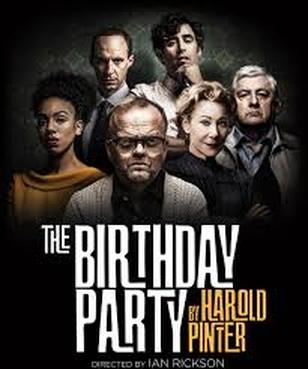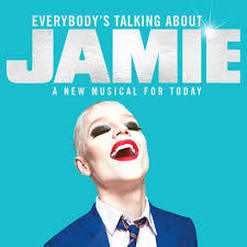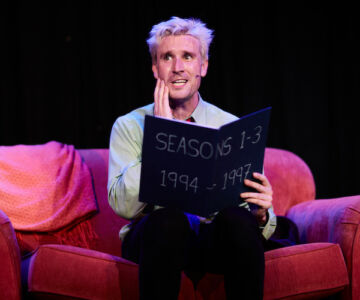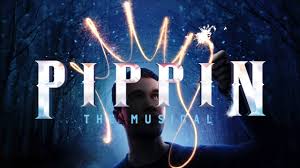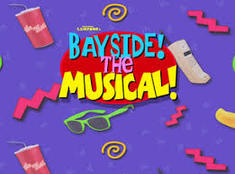 ‘Bayside! The Musical’ in London: Did They Even Have ‘Saved By The Bell’ Here?by Randi / March 13, 2018
‘Bayside! The Musical’ in London: Did They Even Have ‘Saved By The Bell’ Here?by Randi / March 13, 2018I’ve said in the past that I am not a huge fan of Harold Pinter plays, but I keep seeing them because Elaine Stritch tells me to. I just don’t understand them. They never make any sense and I always leave the theatre going, ‘…what?’ And it’s not just me being stupid; apparently, that’s his thing. Pinter got his jollies by giving audiences vague hints at plot and truth and then letting them decide what’s what. Which I guess is a valid thing for you to do if you have a purpose, but I never know what that purpose is. It’s not like I’m having deep epiphany-like thoughts when trying to figure out wtf was happening. But, anyway, it turns out that FINALLY, you can enjoy a Pinter play even though you don’t know what’s going on, as I learned from London’s new production of “The Birthday Party”. There’s a lot of crazy going on and there’s no real sense of what’s true or even who is real, but it’s a really enjoyable, provocative time.
TBP (not The Bad Place (well maybe The Bad Place)) tells the story of Meg and Petey, an old couple living in a quiet English seaside town, running a boarding house. Petey works by the shore, setting up deck chairs for the tourists and Meg makes him bowls of cornflakes and inquires incessantly as to whether they’re ‘nice’, as that’s how British English describes food and I think no matter how long I live here I will never stand for it. As a long-married couple, they seem boring but inoffensive, and Meg’s unremitting questions about the weather and whether it’s ‘nice’ like the cornflakes and whether the fried bread she made Petey is ‘nice’ are annoying but in a ‘oh you old biddy’ type way and not in a rage-inducing way. They’re harmless, bland, so they seem at first. Petey is played by Peter Wright, and I just love when actors play characters with the same name. It makes me laugh to imagine costars saying ‘Oh hey Pete – oops, I mean Pete’ it’s nonsense don’t worry about it. Meg is played by the great Zoe Wanamaker and she is all kinds of unstable genius. Her state of mind, at first easily brushed aside as that of an old biddy, is really the centerpiece of the play, and the question of whether she’s a trustworthy commentator on her surroundings and the people around her shockingly morphs into whether everything we saw was just in her head. And Zoe conveys that with restraint and precision.
The boarding house has one lodger, a man named Stanley who is as peculiar as he is disheveled. Played by the outstanding Toby Jones, Stanley raises more questions than he or anyone in any Pinter play will ever answer. He’s been staying at Meg & Petey’s house for a year now, after working as a concert pianist all over the world…or maybe just all over England…or maybe he just played once. Meg treats him like a son, forcing him to wake up before too late, making him all his food, &c. At first I thought it was her son, and so you wonder about their relationship and then you wonder about Meg’s ‘offhand’ comment about how she always wanted a son. Does that explain why she treats him like this? or does that hint that he’s a figment of her imagination? Every little comment in this play is there for a reason. We will never be able to say for sure what they all add up to, but they definitely suggest that you can’t trust anything people say.
Everything changes when two men in business suits arrive, two mysterious men whose work and purpose for being in town are unknown and yet sinister. There’s the clear boss of the operation, Goldberg, played by Stephen Mangan who is usually hilarious but is here is terrifying. And sometimes hilarious but mostly terrifying. He’s Jewish and they mention that a lot. His colleague is an Irish man named McCann (Tom Vaughan-Lawlor), who is an unfrocked priest (from the village of Kamenka?), maybe, and seems nice but can be equally frightening when he gets riled up, which seems right for a priest. The two men take up a room at the house – which Petey is surprised that Meg has available for guests, which is surprising to us because we’re like aren’t you a boarding house? Stanley asks the men why on earth they would choose to stay here. Well, it’s a boarding house, right? Meg says repeatedly that it’s ‘on the list’ for seaside accommodations. Stanley scoffs and says that it isn’t a boarding house, but no one really makes anything of that.
The first act flies by and is really flawless. Well, it’s only 45 minutes so it better fly by, but still every bit felt necessary and enjoyable. The second act is a lot longer, an hour and a half maybe, and it’s a lot darker. Meg decides to throw Stanley a birthday party now that they have the men to be guests, along with neighbor Lulu (Pearl Mackie). Stanley resists and quite often tells Meg and the others that it’s not his birthday, that it’s actually next month, but no one seems to hear him or if they do they don’t mind. Meanwhile, Goldberg and McCann’s business is ever more clouded and yet more menacing, and they seem to know Stanley. And sometimes Stanley seems to know them. They have similar memories from their pasts and yet they deny them. Goldberg and McCann’s first names change at every mention. And while you first consider Stanley to be the unwitting victim in whatever game the men are playing, he morphs at times into the predator, albeit in an unknown fight. Everything feels up in the air and uncertain and nothing will stick as truth.
The actual birthday party is even stranger, with Meg too drunk to notice that the two men are psychologically torturing Stanley, who at one point freaks out and then tries to strangle Meg. It’s unclear who turns the lights out or why, but when they come back on it 100% looks like Stanley has killed Lulu. It’s undeniable and so I think it’s purposeful, for you to be so convinced of something only to find out later that that’s false, to further the entire theme of this play. (Pearl herself said at stagedoor that everyone always says to her ‘I thought you were dead!’ so we are clearly supposed to think that.) Every few minutes you think you figured out what’s happening, who’s good, who’s bad, but then that would all get turned on its head and you’d be back to square one.
It’s the kind of drama that makes you hold your breath a lot of the time, because there’s no predicting what is going to happen next and how bad it’s going to get for someone. And because so much is unknown and unclear, it’s overall very chilling. We don’t know what’s happening, the characters don’t know who each other are or what they want, and everything can very quickly turn even darker. While there’s a good deal of humor, that often makes everything scarier. Nothing like watching the terrifying Stephen Mangan laugh at something and then instantaneously become more threatening than before. Although my favorite part of the show is a very non-threatening joke, when McCann tells his boss, “You’ve always been a true Christian”, and Goldberg replies “…in a way.” But the best moment of perfect directing and acting and menace all around comes when Stanley erupts at Goldberg and yells at him for being a ‘dirty joke’, but Toby Jones holds the ‘j’ on joke in a way where it’s clear Stanley was about to say ‘dirty Jew’. It’s brilliantly done.
In the last scene, things sort of fell apart for me, simply because we don’t know what’s happening or why or where the men are taking Stanley. And all the unknown elements started to annoy me instead of inspire me to think more creatively or whatever Pinter wants us to do. It just got to be a bit much. But Zoe as Meg brings it home, as she reminisces about the party the night before, the utter shitshow of a party that led to attempted murders and other illegal activity, including the abduction of Stanley to who knows where. But she doesn’t know or care, she just knows she was the belle of the ball. And it’s framed exactly the same as the opening scene, just her talking to her placating husband, and you wonder if any of the intervening scenes actually happened or if reality, whatever that is, has been just this the whole time, just the two of them living their humdrum lives, talking over cornflakes with no one else around.
If I were watching this at home I would have been screaming the entire time. What are you doing! Who are you! Why wouldn’t you comment on what JUST HAPPENED? But as a whole, the play is really remarkably well done, and the acting is stellar. There are a few moments where you question why on earth an actor chose to deliver a line that way, not the way you would have expected it (often with Mangan’s character), but it makes a certain odd sense that everything even down to the delivery would be uncomfortable and often off-putting. A part of me wants to shake the ghost of Pinter and be like what the ffffffff happened but you know what, I think I’m okay just wondering about it. Or maybe I’ve reached that point in my Pinter experiences where I just don’t care anymore.
INFORMATION
This production is playing at the Harold Pinter theatre until April 14. The theatre is a mess and is the one most in need of a refurbishment. The lobby and entrance area is so small that not many people can actually fit there, which is for sure a fire hazard. If you are sitting in the stalls, sit in the area at stage right (house left) because that’s closer to the good toilets (they are like right there if you are in rows E-H, which we were yayyyyy) and the exit.
AUDIENCE
No phones, thank god, but somehow a LOT of talkers who didn’t understand that they shouldn’t be talking to their companions the entire time and like, NOT in a whisper??? Wtf is wrong with people.
STAGE DOOR
Everyone but Zoe came out and signed and took pictures! They were very nice. Actually Zoe may have come out but I bounced after a little because I needed the aforementioned ice cream. It’s not a bad walk to the vegan ice cream shoppe Yorica! so I strongly recommend going there afterwards. I love their soft serve. I love all soft serve but theirs is particularly good because it has that bland lightness I enjoy. What were we talking about? Oh theatre. Go see theatre.


